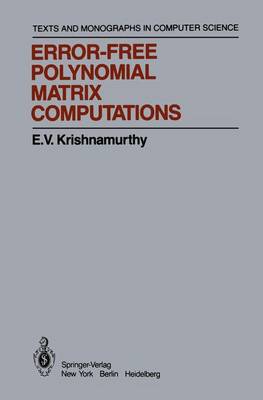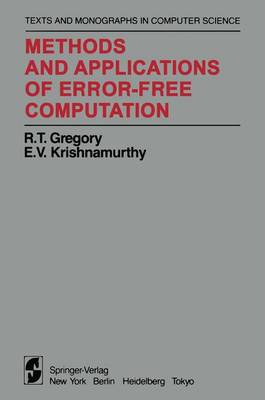Monographs in Computer Science
2 total works
This book is written as an introduction to polynomial matrix computa tions. It is a companion volume to an earlier book on Methods and Applications of Error-Free Computation by R. T. Gregory and myself, published by Springer-Verlag, New York, 1984. This book is intended for seniors and graduate students in computer and system sciences, and mathematics, and for researchers in the fields of computer science, numerical analysis, systems theory, and computer algebra. Chapter I introduces the basic concepts of abstract algebra, including power series and polynomials. This chapter is essentially meant for bridging the gap between the abstract algebra and polynomial matrix computations. Chapter II is concerned with the evaluation and interpolation of polynomials. The use of these techniques for exact inversion of poly nomial matrices is explained in the light of currently available error-free computation methods. In Chapter III, the principles and practice of Fourier evaluation and interpolation are described. In particular, the application of error-free discrete Fourier transforms for polynomial matrix computations is consi dered.
Methods and Applications of Error-Free Computation
by Robert T. Gregory and E.V. Krishnamurthy
Published 9 August 1984
This book is written as an introduction to the theory of error-free computation. In addition, we include several chapters that illustrate how error-free com putation can be applied in practice. The book is intended for seniors and first year graduate students in fields of study involving scientific computation using digital computers, and for researchers (in those same fields) who wish to obtain an introduction to the subject. We are motivated by the fact that there are large classes of ill-conditioned problems, and there are numerically unstable algorithms, and in either or both of these situations we cannot tolerate rounding errors during the numerical computations involved in obtaining solutions to the problems. Thus, it is important to study finite number systems for digital computers which have the property that computation can be performed free of rounding errors. In Chapter I we discuss single-modulus and multiple-modulus residue number systems and arithmetic in these systems, where the operands may be either integers or rational numbers. In Chapter II we discuss finite-segment p-adic number systems and their relationship to the p-adic numbers of Hensel [1908]. Each rational number in a certain finite set is assigned a unique Hensel code and arithmetic operations using Hensel codes as operands is mathe matically equivalent to those same arithmetic operations using the cor responding rational numbers as operands. Finite-segment p-adic arithmetic shares with residue arithmetic the property that it is free of rounding errors.

